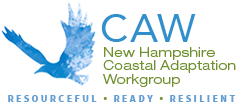By: Steve Miller, Great Bay National Estuarine Research Reserve
On May 13, CAW held its 18th workshop, titled WHAT ARE PEOPLE SAYING ABOUT TAKING ACTION ON CLIMATE? The workshop examined national survey data from the Yale Program on Climate Change Communication (YPCCC), together with data from more than 40 New Hampshire, regional, or nationwide US surveys conducted by the UNH Survey Center (2010-2019). The goal was to find out what the surveys tell us about support for climate action, climate policy, and resilience-building efforts. The objectives were to help municipal officials and community groups understand what people support regarding climate change.
The presenters were Lawrence Hamilton, Professor of Sociology from the University of New Hampshire, and Matt Cutler, Social Scientist from the Northeast Fisheries Science Center, National Marine Fisheries Services. Matt did a post doc at Yale with the YPCCC.
A key part of the workshop was the focus on the value and need for people to talk about climate change with their families, friends, and peers. The workshop activity reviewed effective ways to talk about climate change through a short video, The SECRET to talking about climate change, and two handouts: Have the Talk – Climate Conversation Worksheet and a Share Your Story Worksheet. After reviewing the materials, there was a very engaged conversation about what the surveys tell us about taking climate action and a discussion about the value of talking climate with friends and family.
“There is an urgent need to engage Americans in the issue of climate change. Social science research has focused on many of the factors that influence public engagement, but surprisingly little of this research has examined the role of one of the most trusted sources of information: friends and family.”
-YPCCC Article, Discussing global warming leads to greater acceptance of climate science, link
This article investigates the role of climate conversations with friends and family in changing people’s beliefs and concern about climate change. The research “surveyed a nationally-representative sample of American adults twice (N = 1,263), approximately seven months apart, and found that people learn important facts about climate change through discussion with friends and family. Specifically, discussing climate change with friends and family led to enhanced understanding of the extent of scientific agreement about human-caused climate change. In turn, better understanding of the scientific agreement led to increased belief that climate change is happening and is human-caused and to increased worry about it. Interestingly, we also found evidence that the link between discussion and climate beliefs can operate in the opposite direction. That is, increased perceptions of scientific agreement led to increases in discussions about climate change – suggesting that climate conversations can initiate a positively reinforcing cycle between learning, and further conversation. These findings highlight the importance of climate conversations with friends and family, which can engage people more deeply in the issue of climate change.”
The presentations, video link, and other climate communication resources can all be found here under Workshop 18 | What are people saying about taking action on climate? (May 13, 2019).
